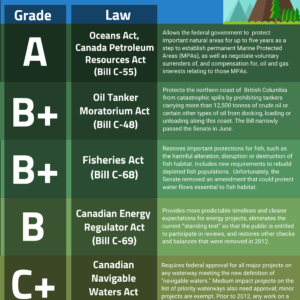House of Commons Passes Reformed Environmental Laws

Stephen Hazell, Director of Conservation and Legal Counsel.
On June 20, 2018, the House of Commons passed two important environmental laws — Bills C-68 and C-69. Bill C-68 reforms the Fisheries Act, largely fulfilling the Trudeau government’s election promise to restore legal protection of fish habitat. Bill C-69 includes two new laws: Impact Assessment Act and Canadian Energy Regulator Act, and amendments to the Navigable Waters Act.
Nature Canada’s view is that, overall, a reasonable balance has been struck in Bill C-69 and that it will assist in regaining public trust in reviews of natural resource development projects. This new legislation is a darn sight better than what we have right now.
Bill C-69 includes important reforms such as emphasizing sustainability and a single-agency approach to assessing resource projects, eliminating rules restricting public participation in hearings, and establishing a legislative framework for conducting regional and strategic impact assessments. The House of Commons Environment Committee successfully added several helpful amendments to Bill C-69 including the following:
- the government’s mandate in administering the Act is expanded to include respect for commitments to the rights of the Indigenous peoples of Canada and exercise powers to adheres to principles of scientific integrity, honesty, objectivity, thoroughness and accuracy;
- decisions on projects will be “based on” the impact assessment report and in consideration of section 63 factors;
- references to public participation were generally revised to add the adjective “meaningful”; and
- Regulators such as the Canadian Energy Regulator and Canadian Nuclear Safety Commission may not constitute a majority on review panels, nor may they control the chair.
The Senate now has the opportunity to consider Bills C-68 and C-69. However, the current Parliamentary session will end 12 months from now, after which the campaign leading up to the October 2019 federal election will begin in earnest. We expect that this schedule provides plenty of time for the Senate to complete its deliberations and pass these bills.
Assuming Bills C-68 and 69 are passed by the Senate, their effectiveness depends hugely on regulations now being developed. The current federal environmental assessment law requires only that a handful of projects—mainly mining projects—be assessed in any given year by virtue of their being listed in a regulation.
Nature Canada will be arguing strenuously that regulations should require that the following categories of projects should be required to be assessed by law:
- projects that produce large quantities of greenhouse gas or other air pollutants (such as the proposed cement plant to be located near Hawksbury Ontario 70 km upwind from Montreal);
- projects that are to be located in National Parks or National Wildlife Areas (such as the proposed alpine facilities in Banff National Park for the Calgary 2026 Winter Olympics bid); and
- projects that require permits or approvals under the Fisheries Act or Species at Risk Act.
To Nature Canada, it is just common sense that projects that affect Canada’s ability to meet its responsibilities under the Paris Climate Accord or the Convention on Biological Diversity should automatically be assessed under federal law.

|
Want more nature news?Discover more about the nature you love. |



